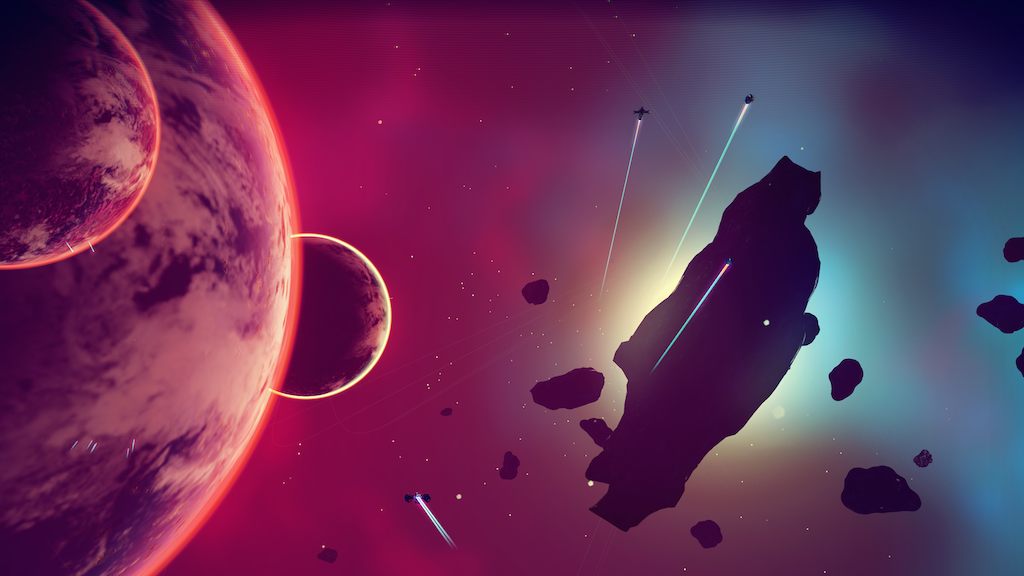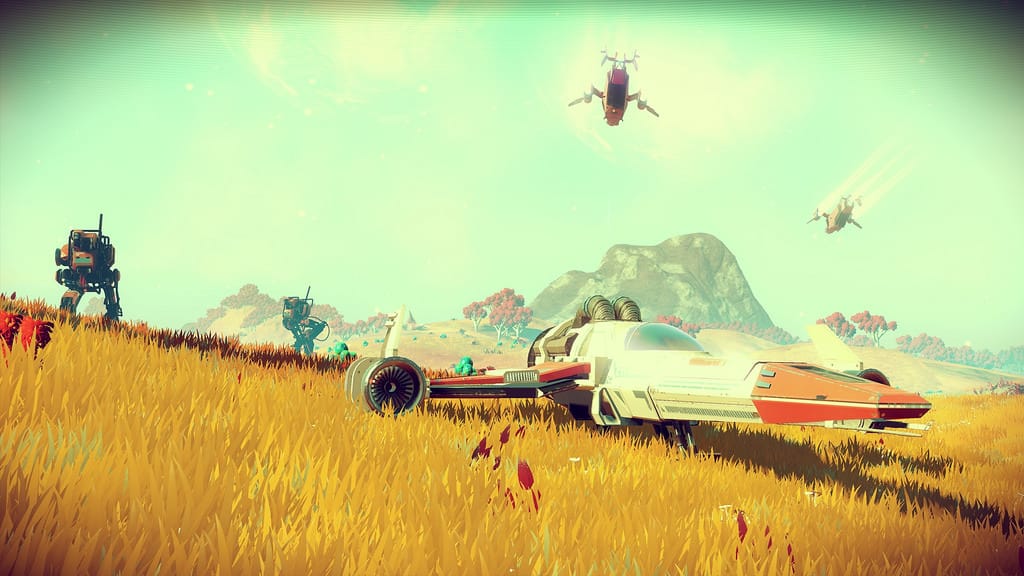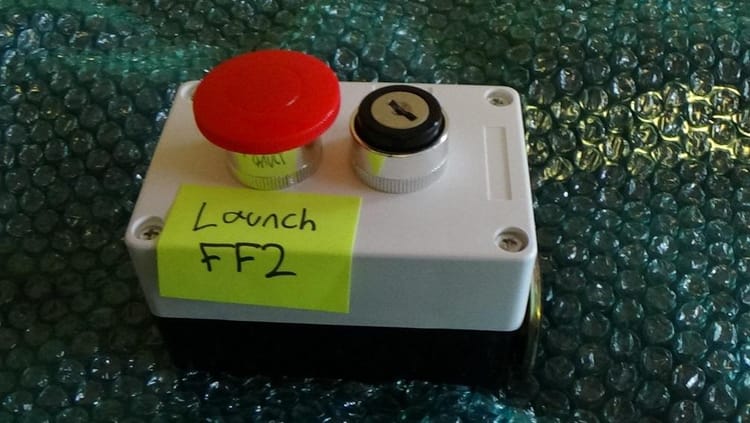No Man’s Sky and the Naming of God

In Darren Aronofsky’s 1998 film Pi, a mathematician is doomed by a recitation of the divine name. Young Max Cohen, the Icarus of New York City, is a socially anxious shut-in who devotes his time and his ultra-sophisticated computer technology to finding a predictable pattern in the stock market. Cohen names his computer Euclid; both the name of a Greek geometrist and the starting galaxy in No Man’s Sky. His conviction, expressed as a tidy syllogism in a recurring voiceover fragment, is that since nature is made of patterns, and math is the language of nature, everything in nature has a pattern. The universe is a veritable theater of processes, governed only by the purity of numbers and the unthinkable infinity of the possible relations between them.
Cohen eventually finds his pattern in the form of a 216-digit number. As he internalizes the numerals and their relations, it destroys him: lifelong cluster headaches intensify, hallucinations disrupt his days, and paranoia finds its realization in persecution. Although it was the stock market he wanted to predict, Cohen doesn’t try to capitalize on his gains. He even refuses to explain his understanding of the pattern when a group of investors who provided him with a piece of critical technology hold him at gunpoint. Cohen is saved from the investors by a group of Hasidic Jews who reveal that the 216-digit number he’s found is nothing less than the true name of God. But he is unimpressed by their request for the number, and the Messianic Age it heralds: “I found it,” he says. “It was given to me.” In the end, however, he gives it back. At the film’s climax, we see a shot of Cohen against a pure, white light serenely reciting the divine digits. Then he wakes up, racked by the worst of migraines, and sticks a power drill in his head.
What is Max Cohen’s sin? The investors wanted to profit from the pattern, but even when they get a copy of the number, they are unable to use it properly: they crash the market instead of conquering it. They are victims of their own sense of entitlement, demanding that the world conform to their expectations when they throw money at it. As for the Hasids, their lust was for a kind of power that their people had been deprived of since the Roman destruction of Judea. Their resort to violence and threats in the face of Cohen’s refusal to cooperate belies their own claim to legitimacy. Unlike either of these groups, Cohen didn’t want money or power—only knowledge. But by refusing to share his wondrous knowledge with anyone else, Cohen ultimately lost what it had to offer, and the world lost it with him. Had it been a few years later, he might have avoided all the trouble without ever stepping outside his apartment door. It takes no time at all to post a 216-digit number on Reddit.
The universe is a veritable theater of processes
No Man’s Sky is a game about naming things. It can be about many other things, if you like: discovery, wandering, existential angst, shooting stuff, grinding, pantheism, crafting, not grinding, blasting your rocket pack and falling repeatedly to the ground, feeding the dogs, dogfighting, fighting the dogs. But many people seem unable or unwilling to see what the game is, rather than what they wanted it to be, or thought it might be. Like the investors in Pi, they are too focused on the immediate returns on their temporal and monetary investment, as if they had been salivating over No Man’s Sky for the last three years as a personal favor to Sean Murray. One critic has even called the game “anti-consumer,” presumably with the implication that this is a bad thing. And beneath all of the discontent is the insistent refrain that there is nothing to do in this galaxy-sized game.
So here’s a thing you can do in No Man’s Sky: you can name things. You name star systems, you name planets, you name plants and animals of every form and hue. You have the opportunity to name more things than you could possibly come up with names for. And you get points for naming things, but that isn’t the point. The point is to name them well. And that requires a bit of thought about what makes a name, and what a name makes.
In Western culture, the paradigmatic naming scenario is in the first few pages of the Bible. Here, God creates the world by naming it piece by piece: “Let there be light,” he says, and light there is. This cycle repeats until he creates Adam, the first man, who lives in the Garden of Eden. Adam, made in God’s image, is God’s surrogate in creation, so he adopts some of his authority. God gives Adam dominion over “every beast of the field and every bird of the sky,” and marks this dominion by making Adam—who has nothing better to do anyway—give a name to every type of creature there is.

There are two distinct functions played by names in these verses from the Book of Genesis. When God names something, he brings it into existence. This association between God’s language and his creative power is reinforced by a famously obscure verse from the Gospel of John: “In the beginning was the Word, and the Word was with God, and the Word was God.” This verse seems to make even God subservient to “the Word,” as if his own name preceded him. On the other hand, mortals are not given the power of creation. Ours is the power of possession. And for Adam in the Garden, the universal act of naming is an assumption of ownership over nature. This territorial function of naming, mythologized in Genesis, later served as a model for the colonial appropriation of indigenous land throughout the world: plant a flag someplace you’ve never been, call it something new, and it is yours to reap.
It doesn’t take much imagination to see the universe of No Man’s Sky as a new, virtual Garden of Eden, replete with more beasts than even Adam had time to meet. Its uncivilized wilds and lonely trading posts reinforce the sense that you are one of a few to have just awakened in existence for the first time. But No Man’s Sky encourages you to constantly uproot and explore, while Eden was meant to be a permanent paradise. The Garden was resplendent with light, God’s first creation, while No Man’s Sky makes you feel the distance between your character and the radiance at the center of the universe. For all the time you spend lasering plants and rocks into resources, the game doesn’t allow you to maintain any kind of dominion over these planets. And your limited inventory doesn’t let you keep more than what you require for the task at hand. You, needy and fragile, are no conquistador; No Man’s Sky is not a campaign. If there is any meaning to the names you leave behind, it isn’t explicable through the paradigm of Genesis.
No Man’s Sky encourages you to constantly uproot and explore
In A Wizard of Earthsea (1968), the first volume in Ursula K. Le Guin’s fantasy series, we find a version of an older, more mystical function for naming. In Le Guin’s world, creatures human and otherwise are typically known by many names. The protagonist begins as Duny, then becomes Sparrowhawk, and is rechristened as Ged when he comes of age. But Ged is his unique “true name,” and anyone who knows him by this name can assume control of his actions. Ged later draws on this power when he wards off the dragon Yevaud by naming him: “When he spoke the dragon’s name it was as if he held the huge being on a fine, thin leash, tightening it on his throat.” Naming functions here as a mechanism of power rather than possession. But the structure of the act is different. For Adam, possession was coequal with the original christening; for Ged, the power comes from knowledge of the true name that is coequal with the dragon’s very existence.
This conception has roots in a different current of religious thought that recurs in different forms across Judaism, Russian Orthodoxy, and Islam. In this tradition, the dragon is God. God has a true name, and to know and speak that name is to assert a kind of power over God. This is why the Hasids are so determined to acquire Max Cohen’s pattern in Pi: by translating the pattern into letters through the obscure art of gematria and intoning them, they hope to bring God’s power to earth to begin an apocalyptic Messianic Age. This fictional scenario illustrates the real belief in traditional Judaism that God’s name somehow contains God’s essence, and must therefore be treated with care. Meanwhile, a sect of Russian Orthodox Christians called the “Name-Worshippers” accord an even greater power to the name of God. For these believers, “the name of God is God,” and through ritually repeating it, we can gain enlightenment and greater understanding. Moreover, if God truly is his name, then to utter that name is to continually recreate our creator.

The bridge between name-worshipping and No Man’s Sky is mathematics. When Georg Cantor demonstrated in the late 19th century that there are different infinities, math and theology began to mingle in strange ways. If we can prove that, say, the set of all natural numbers and the set of all real numbers are infinite, but that there must always be more real than natural numbers, then we admit the existence of different infinities. But what is that “existence?” Does a particular infinity have a reality of its own, or is it a construct of thought? For the Moscow School of Mathematics, whose list of founders includes several prominent Name-Worshippers, both answers were true: mathematical objects like different infinities are real because we can name them. In this way, they are no different than God.
No Man’s Sky is not an infinitely large game, but the size of its universe so exceeds human standards of comprehension that it might as well be. Some have suggested that the size is irrelevant to the game’s quality, as if a game with 18 quintillion procedurally generated planets is no more interesting than a game with eight. In my opinion, this argument doesn’t hold because human beings are not infinite, and neither are our memories or imaginations. Infinity lives only in our equations, and can only be approximated through the technologies that do what we cannot.
The equation at the core of No Man’s Sky which generates the game’s unthinkable diversity provides such an approximation, but it needs the player to fully do so. Most of what we loosely refer to as the universe of No Man’s Sky exists in a purely virtual, purely potential form—even its creators don’t know what’s there, because what’s there isn’t really “there” yet. It only exists as a pure variation of an algorithm. It isn’t until a player ends up in the right spot, whether through the lottery of spawn points or through deliberate exploration, that the corresponding systems are generated—and that player can be anyone. You are the ontological catalyst.
You are the ontological catalyst
This puts a democratic twist on the theology of naming, and creates a new model with few precedents. It is a model of pure discovery, unsullied by either possession or power. To name something in No Man’s Sky is not a matter of saying “I was here first,” or “This is mine.” It is a pure affirmation: “This exists.” And what “this” is, its individual nature apart from the process which generated it, is what you help to determine by naming it. A player that touches down in some distant future on a planet you named will have a different experience of the environment depending on whether you name it “Heaven,” “Hell,” or “Harambe.” So when you leave the system or turn off the game, the objects you actualized don’t slip back into the virtual ether because they are no longer the same objects. And the mark of that change, should you choose to leave it, is a name.
Does this leave a place for God in the cosmos of No Man’s Sky? If a god is a creator, then everyone who plays the game is a god and the apostolically bearded Sean Murray merely our shepherd. Or perhaps God is contained in the equation itself, as he was in Max Cohen’s 216-digit pattern. I’m no Cohen, but my personal conviction is that God is everywhere in this game, just as the equation is. We need not long for the bright center of the galaxy, for its light suffuses the cosmos. One name for such a belief is pantheism. But if God is everything, then so is that name. Like the universe of this bountiful game, it speaks, and it says that everything new is a return. That it doesn’t matter if you don’t play No Man’s Sky, because you are, and you have, and you will forever. Call that a stretch, if you like. But call it something.



